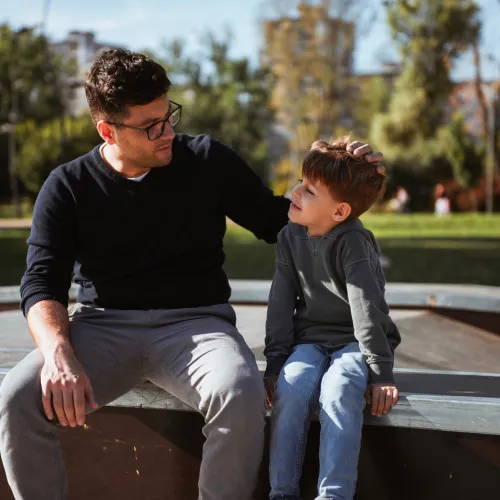Coping Through the Emotions of Co-Parenting Drop-Offs: A Survival Guide
1. Source of stress: You feel too many emotions
If you feel a mix of emotions during a changeover—maybe sadness, guilt, relief or anxiety—rest assured that your experience is normal. It can feel strange to be separated from your own child.
“It gets easier with time, right?” well-meaning friends might ask. “Shouldn’t it feel normal by now?” But for many parents, it never feels easier. The very fact that it’s a recurring event, a regular part of your life, almost makes it worse. It might feel wrong to be separated from your own child.
There’s no simple fix, but you still have to get through it—over and over.
Strategy: Acknowledge your feelings.
Pretending you feel fine, or trying to muscle through and just stop having these emotions, can be counter-productive. Instead, give yourself permission to experience them. Just remind yourself that feelings are fleeting if you don’t lean into them, says US-based psychologist Dr. Cynthia Sortisio, PhD.

2. Source of stress: You feel disconnected from your child
When your child is with their other parent, you might have a strong sense of uncertainty when you don’t know where they are, what they’re doing or how they feel at any given moment. It can be deeply uncomfortable.
Strategy: Separate your perspective from your child’s
When you drop your child off, you’re childless for a while. But it’s important to keep in mind that your child is not parentless, says Dr. Sortisio. The impact is different.
Remind yourself that your child is still being parented, even if it’s different. They’re still with their mum or dad, possibly even having a good time, so they might not miss you the way you miss them. Even if your heart aches, theirs might not ache as deeply—even if they love you and miss you very much.
3. Source of stress: You worry about your children
What about when you don’t trust your co-parent to be a good parent? If you have a high-conflict relationship with your former partner, you might think your child is struggling the whole time they’re away from you.
But that’s not necessarily true—even if your child says it’s true. They might be telling you what you expect to hear. Your child loves you and is never going to say, “Dad makes better mac and cheese, so I prefer dinner at Dad’s” or “Mom lets me stay up 15 minutes later, so I like evenings there better.” Your child doesn’t want to hurt your feelings—or get in trouble.
Strategy: Realise that different parenting approaches can benefit your child
“There’s a pretty broad umbrella of ways to parent,” says Dr. Sortisio. “There are lots and lots of ways to parent that are fine. Just because your co-parent isn’t doing everything the way you would do it, doesn’t mean they’re doing it wrong.”
Actually, “A contrast in parenting approaches can actually benefit your child,” explains Dr. Sortisio. “It teaches them to be resilient, to cope with change, and to accept differences.”
If you can reframe the experience as something that benefits your child rather than harming them, it’s much easier to live with.
Here’s a metaphor from Dr. Sortisio: Maybe you like Kraft’s extra cheesy mac and cheese, and your co-parent likes Annie’s white cheddar mac and cheese. Both have calories, dairy and plenty of calcium, plus they appeal to a wide range of children. It’s ok for your child to eat a different kind of mac and cheese.
Keep the big picture in mind: In many cases, spending time with both parents is helpful or even crucial to your child’s wellbeing.
NOTE: Of course, this doesn’t apply to abuse
If you think your child is neglected or abused, report it to your family law professionals.
But if your co-parent is simply approaching things differently—even if you think the approach is worse—comfort yourself with the knowledge that it might not hurt your child as much as it hurts you.

4. Source of stress: You feel like you’re losing influence over your children
“As a parent,” says Dr. Sortisio, “you make a million tiny and large decisions that shape what type of person your child becomes. You buy their clothes, feed them a vegan diet, paint their nursery blue and raise them Catholic.
“When you separate from your former partner, your child is influenced by another person who does things differently. Maybe they don’t make them play outside, maybe they allow twice as much screen time.”
Maybe you feel you’ve lost part of your connection to your child.
Strategy: Reframe what connects you to your child
“Finding a way to let go of that control is really hard, but it’s really important,” says Dr. Sortisio. Keep reminding yourself that your child can have different experiences without suffering.
Most importantly, remind yourself that your connection to your child goes much deeper than the colour of their walls or the minutes they spend playing Candy Crush. They love you because you’re their mom or dad, not because you make them play outside every day.
5. Source of stress: Your children gets upset when you drop them off
If your children cry, complain or hesitate when you drop them off with their other parent, it can be very upsetting for all of you. If you have to peel your toddler off you and hand them over against their wishes, it just feels terrible.
But children pick up on their parents’ emotions. That’s probably the biggest reason changeovers should be free of conflict and tension.
Strategy #1: Treat co-parenting drop-offs like any other drop-off
Dr. Sortisio suggests thinking of it like dropping your daughter off at preschool, handing your son to his daycare worker or leaving the children with the nanny.
Transitions can be difficult for children regardless of how they feel about the person or situation they are transitioning to. Most of the time, they will settle in and cheer up within minutes after you leave.
During this tumultuous transition, be careful about what kind of signal you’re sending. Imagine if you sent them to daycare every day with long bear hugs and tearful goodbyes. This kind of reaction just shows them that something is wrong—when really, co-parenting needs to become a healthy, normal life for them.
Instead, suggests Dr. Sortisio, make the transition quick and businesslike. Put a smile on your face and muster up two sentences of polite chit-chat. Pretend you’re an actress or an actor playing a confident role in a quick scene.
(Simply being silent or terse won’t work – children are perceptive, and they’ll pick up on the tension.)
Basically, fake it till you make it. Drop off your children with the same level of confidence as you would drop them off with a babysitter. A babysitter might not give them the same level of care as you do, but they can entertain them, feed them and keep them alive and happy. So can your former partner.
Strategy #2: Create a ritual
If every drop-off feels similar, then the process starts to feel routine instead of stressful. Your ritual might involve a secret handshake, a series of 3 hugs, a high five or taking a selfie together.
You could also bid your child goodbye with the same phrases each time. Something along these lines:
- “I know it’s tough when we’re apart, but we’ll see each other soon!”
- “I’ll be thinking of you—and I bet you’ll be having a good week!”
- “I’m always here for you, even when we’re not together. I love you forever.”
- “Your dad/mum will take good care of you, and we both love you forever!”
- “When’s our next phone call? That’s right, it’s tomorrow! Can’t wait!”
Tip #1: Don't say "I’ll miss you”
Saying “I’ll miss you” might seem harmless, or even comforting, but it puts an emotional burden on your child. When your child hears that, they understand that you’re in emotional pain, and they may feel obligated to make you feel better—at a time that might be emotionally confusing or challenging for them.
Instead, give them space to process their own emotions without feeling like they have to carry yours. If you say, “I’ll be thinking of you!” instead, you’ll let them know that they’ll be on your mind, but without the emotional tag of needing comfort.
Tip #2: Avoid drop-offs completely
If possible, and especially if you and your co-parent are high conflict and the previous strategies aren’t helping, try to avoid face-to-face drop-offs. Maybe you take the children to daycare in the morning and Mum picks them up in the afternoon. Maybe the nanny drives the children to Dad’s house at the end of her shift.
Sometimes the best way to handle difficult drop-offs is just to eliminate them.

6. Source of stress: Coming home to an empty house (or partly empty house)
Some single parents come home to a completely empty house after dropping off their children. Or even if you still have a full house with a current partner and bonus children, you might feel a sense of emptiness without your other child present.
Strategy: Use your childless time thoughtfully
The parents who manage to thrive in this situation, in Dr. Sortisio’s experience, are the ones who say, “This is my me time.” It helps tremendously if you have a plan for how you will use your child-free time.
Refill your own cup and focus on self-care: Relax, go to the gym and spend more time with your friends. Sleep in on the weekend or just savour sleeping through the night. Dive into your hobby, whether you embroider or play the ukulele or golf. Catch up on taxes. Focus on work if you love your job. Eat something other than mac and cheese!
Your time is yours—take advantage of that. Try to enjoy it. Give yourself permission to not feel guilty.
Just because you enjoy sleeping through the night doesn’t mean you love your child any less. It just means you’re making the best of your current situation—and your child wants you to be content with your life. It’s easier for happy parents to help their children thrive.
7. Source of stress: You can’t stop feeling miserable apart from your child
You know what? Feeling miserable is ok. It does feel unnatural to be separated from your child. Sometimes there really isn’t a way to feel ok, says Dr. Sortisio—sometimes it isn’t even advisable to feel ok.
Strategy: Feel your feelings—then refocus
Curl up with a blanket and a pint of ice cream and have a good cry. Missing your child is normal. Allowing yourself to experience your feelings is healthy.
Then, reframe your thoughts. Dr. Sortisio explains that our feelings come from our thoughts—influenced by our experiences, but still regulated by our thoughts.
It’s difficult to choose new feelings, but you can choose new thoughts, and the feelings will slowly but surely follow.
For example, if you see a snake, you might think, “Oh no, it’s going to kill me!” If that’s what you think, then you will feel fear, and consequently you’ll run away. But if you see the snake and think, “Wow, I wonder what kind of snake it is!,” then you might feel curious, and maybe take a picture.
When you drop off your child, you might have thoughts like this:
- My child isn’t safe with my co-parent.
- No one can take care of my child like I can.
- My child will be miserable without me.
- I’ll be miserable without my child.
If you’re thinking along those lines, it only makes sense that you feel distressed.
So challenge those thoughts:
- My child will be treated differently, but they’re still being parented.
- Other people (including babysitters, grandparents, and daycare) can take adequate care of my child.
- My child is resilient and can adapt to change.
- I can reframe my time alone and use it beneficially.
Another important thing to understand is that seemingly contradictory things can be true at the same time. You might be miserable and benefit from your time alone. Your co-parent doesn’t parent the way you parent, and your child will still be ok.
You are coping the best you can, and you can learn to cope better.
The bottom-line strategy: Treat your emotions as a moment, not a path
“No one thinks they’re going to get divorced, especially not a high-conflict divorce,” says Dr. Sortisio. “You get to grieve that. Just don’t let it turn into an identity. There’s a difference between a moment and a path.”
Individual therapy can help you reframe your most painful thoughts into new thoughts that are still true (so it’s still easy to believe and embrace them) but more helpful.
I know you’re taking good care of your children—don’t forget to take care of yourself, too.



